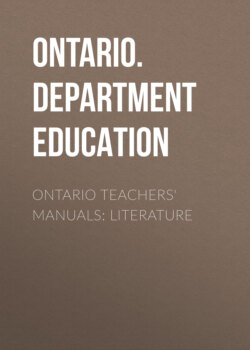Читать книгу Ontario Teachers' Manuals: Literature - Ontario. Department of Education - Страница 24
На сайте Литреса книга снята с продажи.
MEMORIZATION
ОглавлениеTable of Contents
One of the most valuable means of securing an appreciation of literature is the memorization of fine passages of prose and poetry. Pupils from the primary grades upward should be required to memorize systematically several lines of prose and poetry every week of the school year. During childhood the mind is at its most impressionable stage, and what is committed to memory is then retained longer and more accurately than what is memorized at any later period. The passages should be carefully selected and should be suited to the capacity and interests of the pupils. Nothing should be memorized that has not some meaning for them, but it would be impossible to require that every selection should be fully understood. The selections which children commit to memory in the most plastic period of their lives will often reveal a new and unexpected meaning and beauty in later years and will be a source of keen delight and satisfaction. The passages memorized will form a standard, unconscious it may be, by which to test the excellence of other selections.
It is of the greatest importance that the passages chosen should have artistic excellence in thought, feeling, music, imagery, and language. Moreover, these qualities must be present in such a form that they will, when properly presented by the teacher's reading or reciting, appeal, in some considerable measure, to the pupils' capacities and interests. Since there are so many noble passages in English literature, nothing of doubtful value should be memorized.
It is also very important that the teacher himself should have committed to memory and be able to recite freely and expressively every selection he requires his pupils to memorize. It is clear that, if he has memorized it himself, the pupils will be more likely to feel it worth while to do the same.
In conducting a lesson in memorization, it is well for the teacher to arouse the interest of the pupils in the selection as a whole by reciting it himself with expression. Next, he should see that the pupils understand as clearly as possible the meaning, and realize and appreciate, as far as they are able, the feeling of the passage. It should be treated first as an ordinary literature lesson, after the manner already described. It should then be read aloud several times by individual pupils, all trying meanwhile to commit it to memory by concentration of attention on the ideas and their relations, the words and their meanings. The principles of all habit formation apply here—attention to the thing to be learned, so as to get a clear understanding of it, and then repetition with attention. When it has been read several times, individual pupils should be asked to recite it without any aid. It will be found more satisfactory to memorize a complete stanza at a time, or at least a part that expresses a complete thought, rather than to commit to memory a line at a time. With young pupils, however, it is well to take small units and let the children repeat one or two lines at a time till they can give the whole stanza with ease and accuracy.
It is important that all repetition should be individual, not simultaneous. Where the latter method is in use, it is noticeable that pupils adopt a uniform tone and measured rhythm, both of which are undesirable. Moreover, especially with young pupils, there is a danger that absurd blunders made by individuals may pass unnoticed, because the teacher has not the opportunity of detecting them. When the passage has been memorized, it should be repeated daily for a time and then repeated at longer intervals, until there is little probability of its being forgotten.
